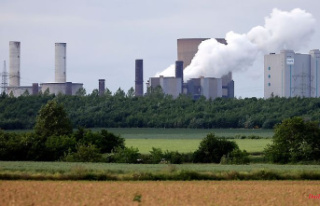Moors have been drained for centuries. However, this is bad for the climate. Drained peatlands release 53 million tons of greenhouse gases annually. But ecosystems can also store carbon dioxide. Environment Minister Lemke presents a plan to use this potential.
The federal government wants to protect Moore better in the future in order to make them fit for climate protection. To this end, the Federal Cabinet has adopted a national strategy for the protection of peatlands. It is intended to help achieve the federal government's climate protection goals and restore biodiversity in moorland.
Currently, more than 90 percent of the moors in Germany are so drained that they release around 53 million tons of greenhouse gases into the atmosphere every year. This corresponds to 7.5 percent of all German greenhouse gas emissions. On the other hand, when peatlands are intact, they are a potent reservoir of climate-damaging carbon dioxide. Among other things, the strategy envisages that rewetting the moors will reduce annual greenhouse gas emissions by at least five million tonnes of carbon dioxide equivalents by 2030. The unit indicates how a certain amount of carbon dioxide effectively affects the climate.
"Drained moors release large amounts of greenhouse gases and thus contribute to the climate crisis, so we have to rewet them," said Environment Minister Steffi Lemke. "As much carbon is stored in the moors as in all German forests put together," emphasized the Green politician.
Agriculture and forestry in particular play a major role in the drainage of the moors. Many drained bogs are used in agriculture as grassland for dairy cattle. The federal government's strategy relies on close cooperation with farmers and financial incentives for rewetting. In addition, rewetted moors are to be managed alternatively in the future in order to create added value beyond the contribution to climate protection.
Agriculture in Lower Saxony is particularly affected by this. Karsten Padeke, chairman of the Wesermarsch district people's association, agrees with Lemke in principle: "We all agree that something has to happen to protect the moors and the climate." For Padeke it is about how the burdens are distributed. "It can't be that a few people have to pick it up on their own. Climate protection is a joint task."
Germany wants to become climate-neutral by 2045 - i.e. only emit as many greenhouse gases as can be bound. Natural climate protection through ecosystems such as forests and moors should help. In order for this to succeed, however, there must be a fundamental reversal. The German forests are now in such a desolate condition that they can only be used to a limited extent as carbon dioxide stores.












